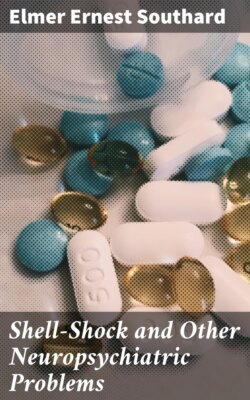Читать книгу Shell-Shock and Other Neuropsychiatric Problems - Elmer Ernest Southard - Страница 80
На сайте Литреса книга снята с продажи.
ОглавлениеConvulsions by autosuggestion.
Case 72. (Hurst, November, 1916.)
A private, 27, is described as a typical martial misfit—in private life a music hall falsetto singer, and afterward a valet. He joined the army in 1915 and proceeded to France, and worked in a canteen. A week later, men broke in and threw a mallet at him, whereupon he immediately had a fit, and was dazed, dumb, and unable to walk for two days. Thereafter occasional further fits occurred, with nervousness and insomnia. He was sent home in September, 1916. Discharged to duty, he again in December returned to France, had six fits in the first week—three in hospital, two on the boat, and between two and four for four days after admission. The diagnosis of genuine epilepsy was made in France by a medical officer who had seen one of the convulsions. However, he had never passed urine or bitten his tongue, had no family history, and had never had fits before going to France.
He was hypnotized and given the suggestion that he would have a fit. In the convulsion which followed the plantar reflexes remained flexor, but otherwise the convulsion was quite like the genuine epilepsy. He was told that he would not have any more convulsions, nor did he have any more except on Feb. 16, 1917, when some talk was made to him about returning to duty. Bromides used in France did not help the epilepsy at all. This patient developed a gait and speech defect copied from two patients in the wards. These symptoms, due to autosuggestion, disappeared on persuasion.
Re autosuggestion, Bernheim has returned to the fray (1917) in a book on automatism and suggestion, dealing only in small part with war problems. The most general formula for suggestion appears to be that it is an idea accepted. A suggestion offered but not accepted is in effect not a suggestion at all. Any accepted idea, says Bernheim, is from the psychological point of view as well as from the medical point of view, a suggestion. A suggestion may be direct or indirect, reasonable or unreasonable, brought about by
(a) mere verbal assertion,
(b) hypnotic state,
(c) persuasive explanation, rational or emotional,
(d) emotion (that is, emotion not the effect of any form of suggestion offered by the physician, but emotion brought about by some event affecting the sentiments of the subject).
